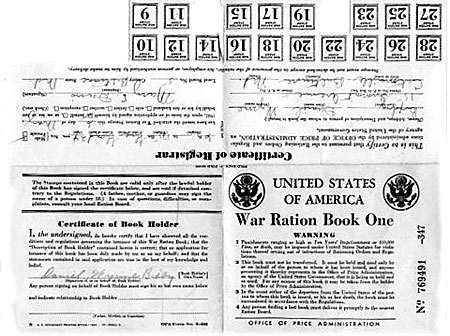Civilian Sacrifices (continued)
Although the nation seemed to be prospering economically, there was still a need to ration, or cut back on certain goods in an effort to support the war. For example, metal that was normally used for zippers or typewriters was now allocated solely for guns. Rubber, which had previously been slated for women’s girdles, was now exclusively used for tires for military vehicles. There were also food shortages. Sugar was considered scarce after the Philippines, which served as a major supplier of sugar to the United States, fell to the Japanese.
Gasoline was also scarce during this period. As a result, people cut down on their traveling or looked for other modes of transportation.
Once again, the Office of Price Administration intervened with ration books. Consumers were allotted so many points that were recorded in these books. When individuals received a certain amount of points for scarce goods, such as sugar, coffee, and butter, they could not purchase these items until they received a new ration book.

War ration book
Civilians were also encouraged to recycle during the war. Tin cans, aluminum, and metal sources were all viewed as highly valuable items and could help secure a victory in the war.